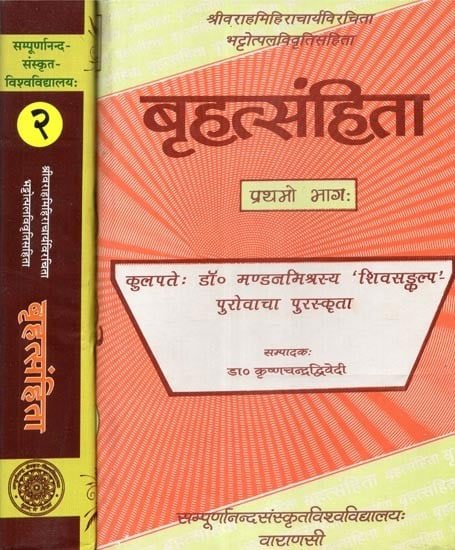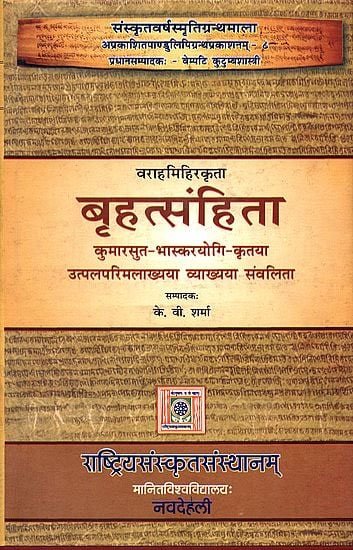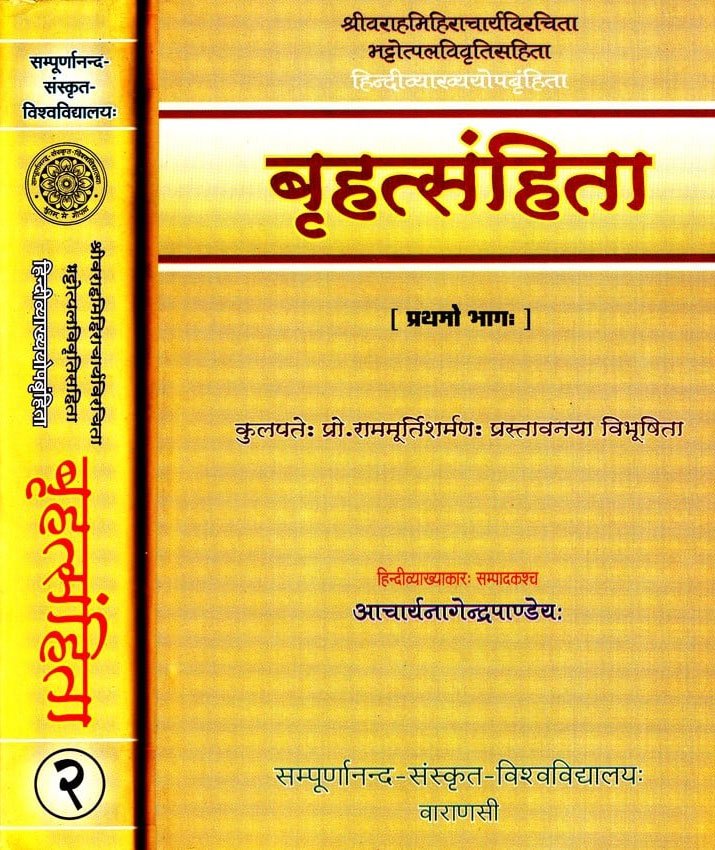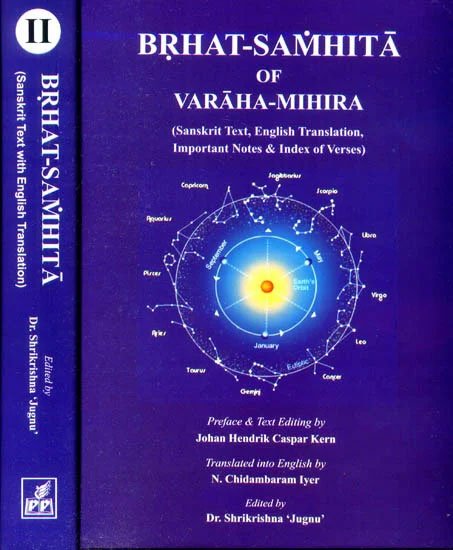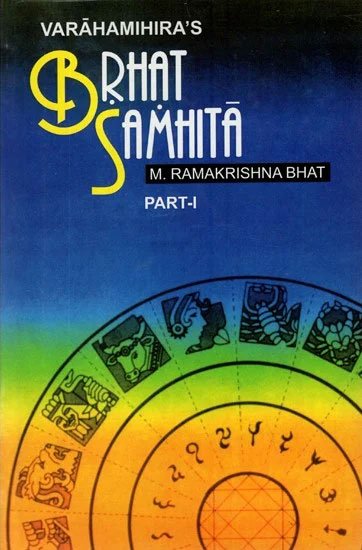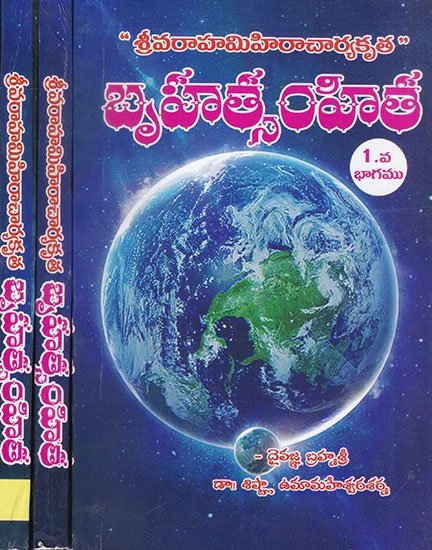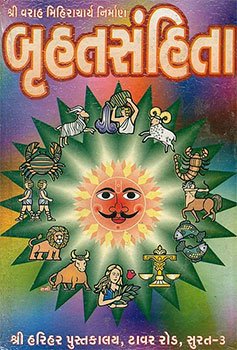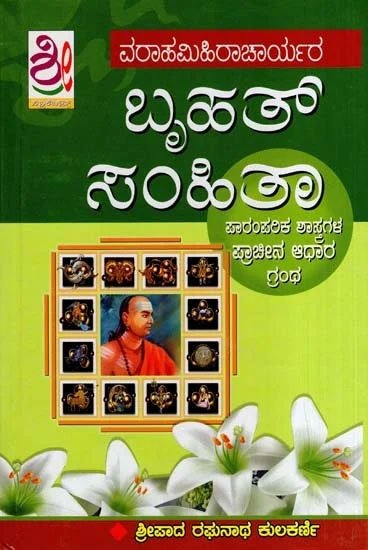Brihat-samhita [sanskrit]
26,560 words
The Sanskrit text of the Brihat-samhita from the 6th-century authored by Varaha Mihira in present-day Ujjain, India. It primarily deals with astrology and astronomy but is presented as an encyclopedia of knowledge.
Verse 68.24
रक्तं पीनकपोलमुन्नतनसं वक्त्रं सुवर्णोपमं वृत्तं चास्य शिरोऽक्षिणी मधुनिभे सर्वे च रक्ता नखाः ।
स्रग्दामाङ्कुशशङ्खमत्स्ययुगलक्रत्वङ्गकुम्भाम्बुजैश्चिह्नैर्हंसकलस्वनः सुचरणो हंसः प्रसन्नेन्द्रियः ॥ २४ ॥
raktaṃ pīnakapolamunnatanasaṃ vaktraṃ suvarṇopamaṃ vṛttaṃ cāsya śiro'kṣiṇī madhunibhe sarve ca raktā nakhāḥ |
sragdāmāṅkuśaśaṅkhamatsyayugalakratvaṅgakumbhāmbujaiścihnairhaṃsakalasvanaḥ sucaraṇo haṃsaḥ prasannendriyaḥ || 24 ||
The Sanskrit text of Verse 68.24 is contained in the book Brihata Samhita (Sanskrit Text with Hindi Translation) by Pandit Achyutananda Jha. This book is available online or you could buy the latest edition:
Read online Buy now! The Sanskrit text by Pandit Achyutananda Jha (2001)
Glossary of Sanskrit terms
Note: This extracts Sanskrit terms and links to English definitions from the glossary, based on an experimental segmentation of verse (68.24). Some terms could be superfluous while some might not be mentioned. Click on the word to show English definitions.
Rakta, Pina, Kapola, Unnata, Nasa, Vaktra, Suvarna, Upama, Vritta, Idam, Shira, Shiras, Akshan, Akshini, Akshi, Madhu, Madhuni, Bha, Sarva, Nakha, Sragdaman, Ankusha, Shankha, Ayuga, Kratvanga, Kumbha, Ambuja, Cihna, Hamsaka, Svana, Svan, Carana, Hamsa, Prasannendriya,
Analysis of Sanskrit grammar
Note: this is an experimental feature and only shows the first possible analysis of the Sanskrit text (Verse 68.24). If the system was successful in segmenting the sentence, you will see of which words it is made up of, generally consisting of Nouns, Pronouns, Verbs, Participles and Indeclinables. Click on the link to show all possible derivations of the word.
- Line 1: “raktaṃ pīnakapolamunnatanasaṃ vaktraṃ suvarṇopamaṃ vṛttaṃ cāsya śiro'kṣiṇī madhunibhe sarve ca raktā nakhāḥ ”
- raktam -
-
rakta (noun, masculine)[adverb], [accusative single]rakta (noun, neuter)[adverb], [nominative single], [accusative single]raktā (noun, feminine)[adverb]√rag -> rakta (participle, masculine)[accusative single from √rag class 1 verb]√rag -> rakta (participle, neuter)[nominative single from √rag class 1 verb], [accusative single from √rag class 1 verb]√raj -> rakta (participle, masculine)[accusative single from √raj class 1 verb], [accusative single from √raj class 4 verb]√raj -> rakta (participle, neuter)[nominative single from √raj class 1 verb], [accusative single from √raj class 1 verb], [nominative single from √raj class 4 verb], [accusative single from √raj class 4 verb]√rañj -> rakta (participle, masculine)[accusative single from √rañj class 1 verb], [accusative single from √rañj class 4 verb]√rañj -> rakta (participle, neuter)[nominative single from √rañj class 1 verb], [accusative single from √rañj class 1 verb], [nominative single from √rañj class 4 verb], [accusative single from √rañj class 4 verb]
- pīna -
-
pīna (noun, masculine)[compound], [vocative single]pīna (noun, neuter)[compound], [vocative single]√pi -> pīna (participle, masculine)[vocative single from √pi class 6 verb]√pi -> pīna (participle, neuter)[vocative single from √pi class 6 verb]
- kapolam -
-
kapola (noun, masculine)[adverb], [accusative single]
- unnata -
-
unnata (noun, masculine)[compound], [vocative single]unnata (noun, neuter)[compound], [vocative single]
- nasam -
-
nasa (noun, masculine)[adverb], [accusative single]nasā (noun, feminine)[adverb]
- vaktram -
-
vaktra (noun, masculine)[adverb], [accusative single]vaktra (noun, neuter)[adverb], [nominative single], [accusative single]vaktrā (noun, feminine)[adverb]
- suvarṇo -
-
suvarṇa (noun, masculine)[compound], [vocative single]suvarṇa (noun, neuter)[compound], [vocative single]suvarṇā (noun, feminine)[nominative single]
- upamam -
-
upama (noun, masculine)[adverb], [accusative single]upama (noun, neuter)[adverb], [nominative single], [accusative single]upamā (noun, feminine)[adverb]
- vṛttam -
-
vṛtta (noun, masculine)[adverb], [accusative single]vṛtta (noun, neuter)[adverb], [nominative single], [accusative single]vṛttā (noun, feminine)[adverb]√vṛt -> vṛtta (participle, masculine)[accusative single from √vṛt class 1 verb]√vṛt -> vṛtta (participle, neuter)[nominative single from √vṛt class 1 verb], [accusative single from √vṛt class 1 verb]
- cā -
-
ca (indeclinable conjunction)[indeclinable conjunction]ca (noun, masculine)[compound], [vocative single]ca (noun, neuter)[compound], [vocative single]cā (noun, feminine)[nominative single]
- asya -
-
√as -> asya (absolutive)[absolutive from √as]a (noun, masculine)[genitive single]idam (pronoun, masculine)[genitive single]idam (pronoun, neuter)[genitive single]√as (verb class 4)[imperative active second single]
- śiro' -
-
śiras (noun, neuter)[compound], [nominative single], [vocative single], [accusative single]śira (noun, masculine)[nominative single]
- akṣiṇī -
-
akṣiṇī (noun, feminine)[compound], [nominative single]akṣan (noun, neuter)[nominative dual], [vocative dual], [accusative dual]akṣi (noun, neuter)[nominative dual], [vocative dual], [accusative dual]akṣī (noun, neuter)[nominative dual], [vocative dual], [accusative dual]
- madhuni -
-
madhunī (noun, feminine)[adverb], [vocative single]madhu (noun, neuter)[locative single]
- bhe -
-
bha (noun, masculine)[locative single]bha (noun, neuter)[nominative dual], [vocative dual], [accusative dual], [locative single]bhā (noun, feminine)[nominative dual], [vocative single], [vocative dual], [accusative dual]bhā (noun, masculine)[dative single]
- sarve -
-
sarva (noun, masculine)[nominative plural], [locative single]sarva (noun, neuter)[nominative dual], [vocative dual], [accusative dual], [locative single]sarvā (noun, feminine)[nominative dual], [vocative single], [vocative dual], [accusative dual]
- ca -
-
ca (indeclinable conjunction)[indeclinable conjunction]ca (noun, masculine)[compound], [vocative single]ca (noun, neuter)[compound], [vocative single]
- raktā* -
-
rakta (noun, masculine)[nominative plural], [vocative plural]raktā (noun, feminine)[nominative plural], [vocative plural], [accusative plural]√rag -> rakta (participle, masculine)[nominative plural from √rag class 1 verb], [vocative plural from √rag class 1 verb]√rag -> raktā (participle, feminine)[nominative plural from √rag class 1 verb], [vocative plural from √rag class 1 verb], [accusative plural from √rag class 1 verb]√raj -> rakta (participle, masculine)[nominative plural from √raj class 1 verb], [vocative plural from √raj class 1 verb], [nominative plural from √raj class 4 verb], [vocative plural from √raj class 4 verb]√raj -> raktā (participle, feminine)[nominative plural from √raj class 1 verb], [vocative plural from √raj class 1 verb], [accusative plural from √raj class 1 verb], [nominative plural from √raj class 4 verb], [vocative plural from √raj class 4 verb], [accusative plural from √raj class 4 verb]√rañj -> rakta (participle, masculine)[nominative plural from √rañj class 1 verb], [vocative plural from √rañj class 1 verb], [nominative plural from √rañj class 4 verb], [vocative plural from √rañj class 4 verb]√rañj -> raktā (participle, feminine)[nominative plural from √rañj class 1 verb], [vocative plural from √rañj class 1 verb], [accusative plural from √rañj class 1 verb], [nominative plural from √rañj class 4 verb], [vocative plural from √rañj class 4 verb], [accusative plural from √rañj class 4 verb]
- nakhāḥ -
-
nakha (noun, masculine)[nominative plural], [vocative plural]
- Line 2: “sragdāmāṅkuśaśaṅkhamatsyayugalakratvaṅgakumbhāmbujaiścihnairhaṃsakalasvanaḥ sucaraṇo haṃsaḥ prasannendriyaḥ ”
- sragdāmā -
-
sragdāman (noun, neuter)[compound], [adverb], [nominative single], [vocative single], [accusative single]
- aṅkuśa -
-
aṅkuśa (noun, masculine)[compound], [vocative single]aṅkuśa (noun, neuter)[compound], [vocative single]
- śaṅkham -
-
śaṅkha (noun, masculine)[adverb], [accusative single]śaṅkha (noun, neuter)[adverb], [nominative single], [accusative single]śaṅkhā (noun, feminine)[adverb]
- atsya -
-
√ad (verb class 2)[present active second single]
- ayuga -
-
ayuga (noun, masculine)[compound], [vocative single]ayuga (noun, neuter)[compound], [vocative single]
- la -
-
la (noun, masculine)[compound], [vocative single]
- kratvaṅga -
-
kratvaṅga (noun, neuter)[compound], [vocative single]
- kumbhā -
-
kumbha (noun, masculine)[compound], [vocative single]kumbha (noun, neuter)[compound], [vocative single]kumbhā (noun, feminine)[nominative single]
- ambujaiś -
-
ambuja (noun, masculine)[instrumental plural]ambuja (noun, neuter)[instrumental plural]
- cihnair -
-
cihna (noun, neuter)[instrumental plural]
- haṃsaka -
-
haṃsaka (noun, masculine)[compound], [vocative single]haṃsaka (noun, neuter)[compound], [vocative single]
- la -
-
la (noun, masculine)[compound], [vocative single]
- svanaḥ -
-
svana (noun, masculine)[nominative single]svan (noun, masculine)[accusative plural], [ablative single], [genitive single]svan (noun, neuter)[ablative single], [genitive single]
- su -
-
sū (noun, masculine)[adverb], [vocative single]sū (noun, neuter)[compound], [adverb], [nominative single], [vocative single], [accusative single]sū (noun, feminine)[adverb], [vocative single]so (noun, feminine)[adverb]
- caraṇo* -
-
caraṇa (noun, masculine)[nominative single]
- haṃsaḥ -
-
haṃsa (noun, masculine)[nominative single]
- prasannendriyaḥ -
-
prasannendriya (noun, masculine)[nominative single]
Other editions:
Also see the following editions of the Sanskrit text or (alternative) English translations of the Verse 68.24
Brhatsamhita with the Commentary of Bhattotpala
by Krishna Chandra Dwivedi (2016)
Publisher: Sampurnanand Sanskrit University; 1229 pages;
Buy now!
Brihat Samhita with the Commentary of Utpalapatimala of Yogisvara
by K. V. Sharma (2012)
Publisher: Rashtriya Sanskrit Sansthan, Janakpuri; 754 pages; ISBN-10; 8186111360; ISBN-13: 9788186111369
Buy now!
Brihat Samhita (Hindi Translation)
by K. V. Sharma (2002)
Publisher: Sampurnanand Sanskrit University; 2359 pages; ISBN-13: 9789387890008.
Buy now!
Brhat Samhita (English translation)
by N. Chidambaram Iyer (2022)
Publisher: Parimal Publication Pvt. Ltd.; 801 pages; Edited by Dr. Shrikrishna Jugnu; ISBN-10: 8171104215; ISBN-13: 9788171104215.
Buy now!
Brhat Samhita (English with notes)
by M. Ramakrishna Bhat (2010)
Publisher: Motilal Banarsidas Publishers Pvt. Ltd.; 1155 pages; ISBN-10: 8120810600; ISBN-13: 9788120810600.
Buy now!
Brhat Samhita (Telugu translation)
by Sishtla Umamaheswara Sharma (2020)
Publisher: Mohan Publications, Andhra Pradesh; 846 pages.
Buy now!Preview of verse 68.24 in Kannada sript:
ರಕ್ತಂ ಪೀನಕಪೋಲಮುನ್ನತನಸಂ ವಕ್ತ್ರಂ ಸುವರ್ಣೋಪಮಂ ವೃತ್ತಂ ಚಾಸ್ಯ ಶಿರೋಽಕ್ಷಿಣೀ ಮಧುನಿಭೇ ಸರ್ವೇ ಚ ರಕ್ತಾ ನಖಾಃ ।
ಸ್ರಗ್ದಾಮಾಙ್ಕುಶಶಙ್ಖಮತ್ಸ್ಯಯುಗಲಕ್ರತ್ವಙ್ಗಕುಮ್ಭಾಮ್ಬುಜೈಶ್ಚಿಹ್ನೈರ್ಹಂಸಕಲಸ್ವನಃ ಸುಚರಣೋ ಹಂಸಃ ಪ್ರಸನ್ನೇನ್ದ್ರಿಯಃ ॥ ೨೪ ॥
Brhat Samhita (Gujarati translation)
by - (2000)
Publisher: Shree Harihar Pustakalay, Surat; Author: Shri Varahamihira Acharya (શ્રી વરાહમિહીરાચાર્ય); 432 pages.
Buy now!Preview of verse 68.24 in Gujarati sript:
રક્તં પીનકપોલમુન્નતનસં વક્ત્રં સુવર્ણોપમં વૃત્તં ચાસ્ય શિરોઽક્ષિણી મધુનિભે સર્વે ચ રક્તા નખાઃ ।
સ્રગ્દામાઙ્કુશશઙ્ખમત્સ્યયુગલક્રત્વઙ્ગકુમ્ભામ્બુજૈશ્ચિહ્નૈર્હંસકલસ્વનઃ સુચરણો હંસઃ પ્રસન્નેન્દ્રિયઃ ॥ ૨૪ ॥
Brhat Samhita (Kannada translation)
by Sripada Raghunatha Kulkarni (2021)
Publisher: Srinidhi Publications, Bangalore; 668 pages with illustrations.
Buy now!Preview of verse 68.24 in Kannada sript:
ರಕ್ತಂ ಪೀನಕಪೋಲಮುನ್ನತನಸಂ ವಕ್ತ್ರಂ ಸುವರ್ಣೋಪಮಂ ವೃತ್ತಂ ಚಾಸ್ಯ ಶಿರೋಽಕ್ಷಿಣೀ ಮಧುನಿಭೇ ಸರ್ವೇ ಚ ರಕ್ತಾ ನಖಾಃ ।
ಸ್ರಗ್ದಾಮಾಙ್ಕುಶಶಙ್ಖಮತ್ಸ್ಯಯುಗಲಕ್ರತ್ವಙ್ಗಕುಮ್ಭಾಮ್ಬುಜೈಶ್ಚಿಹ್ನೈರ್ಹಂಸಕಲಸ್ವನಃ ಸುಚರಣೋ ಹಂಸಃ ಪ್ರಸನ್ನೇನ್ದ್ರಿಯಃ ॥ ೨೪ ॥
![Brihat-samhita [sanskrit] - book cover](/uploads/a/Brihat-Samhita-Sanskrit.jpg)
